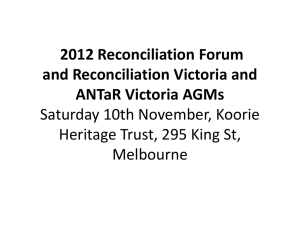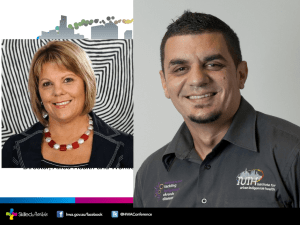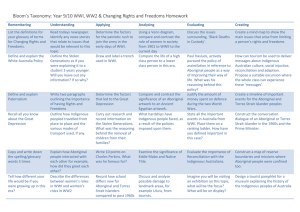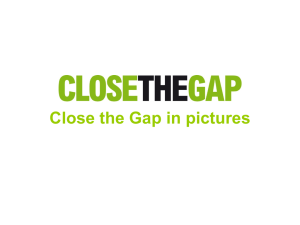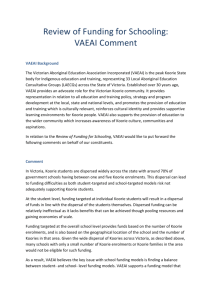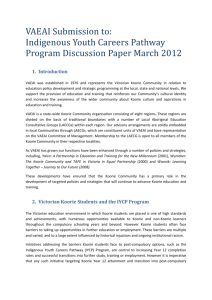VAEAI Position Paper – Koorie/Aboriginal Studies and Education
advertisement
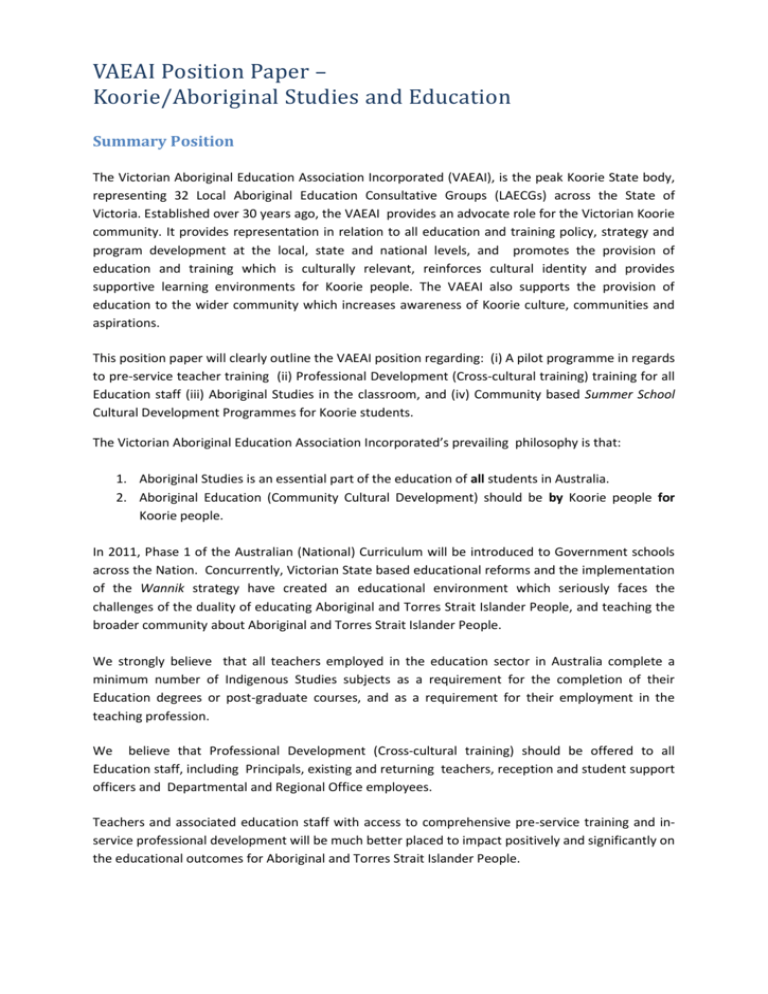
VAEAI Position Paper – Koorie/Aboriginal Studies and Education Summary Position The Victorian Aboriginal Education Association Incorporated (VAEAI), is the peak Koorie State body, representing 32 Local Aboriginal Education Consultative Groups (LAECGs) across the State of Victoria. Established over 30 years ago, the VAEAI provides an advocate role for the Victorian Koorie community. It provides representation in relation to all education and training policy, strategy and program development at the local, state and national levels, and promotes the provision of education and training which is culturally relevant, reinforces cultural identity and provides supportive learning environments for Koorie people. The VAEAI also supports the provision of education to the wider community which increases awareness of Koorie culture, communities and aspirations. This position paper will clearly outline the VAEAI position regarding: (i) A pilot programme in regards to pre-service teacher training (ii) Professional Development (Cross-cultural training) training for all Education staff (iii) Aboriginal Studies in the classroom, and (iv) Community based Summer School Cultural Development Programmes for Koorie students. The Victorian Aboriginal Education Association Incorporated’s prevailing philosophy is that: 1. Aboriginal Studies is an essential part of the education of all students in Australia. 2. Aboriginal Education (Community Cultural Development) should be by Koorie people for Koorie people. In 2011, Phase 1 of the Australian (National) Curriculum will be introduced to Government schools across the Nation. Concurrently, Victorian State based educational reforms and the implementation of the Wannik strategy have created an educational environment which seriously faces the challenges of the duality of educating Aboriginal and Torres Strait Islander People, and teaching the broader community about Aboriginal and Torres Strait Islander People. We strongly believe that all teachers employed in the education sector in Australia complete a minimum number of Indigenous Studies subjects as a requirement for the completion of their Education degrees or post-graduate courses, and as a requirement for their employment in the teaching profession. We believe that Professional Development (Cross-cultural training) should be offered to all Education staff, including Principals, existing and returning teachers, reception and student support officers and Departmental and Regional Office employees. Teachers and associated education staff with access to comprehensive pre-service training and inservice professional development will be much better placed to impact positively and significantly on the educational outcomes for Aboriginal and Torres Strait Islander People. 1.0 Introduction In 1990, the Victorian Government and the Victorian Aboriginal Education Association Incorporated (VAEAI) formalised their roles regarding the education of Koorie people by entering into a partnership - Partnership in Education: Koorie Education Policy, and again in 2001 with Yalca: A Partnership in Education and Training in the New Millenium. In 2008, as a result of this partnership and essential education reforms in Victoria, a strategy for the education of Koorie students in government schools was developed between the Victorian Aboriginal Education Association Incorporated (VAEAI) and the Department of Education and Early Childhood Development (DEECD). For Koorie people in Victoria, Wannik: Education strategy for Koorie students is a significant demonstration that the Victorian government, through Education systems, has a commitment to ‘working with us, not for us’. In 2011, Phase 1 of the Australian Curriculum will be introduced to Government schools across the Nation. The advent of a national curriculum offers “a unique opportunity to ensure that all young Australians learn about the history and cultural background of the nation’s Aboriginal and Torres Strait Islander peoples, of the contribution that has been made to Australia, and of the impact that [colonisation] has had on Indigenous communities, past and present.”1 The focus of this paper is positioned therefore, within four educational frameworks: pre-service teacher training, professional development, curriculum application and Aboriginal Education (Community Cultural Development). This paper will clearly outline the VAEAI position regarding: (i) A pilot programme in regards to pre-service teacher training (ii) Professional Development (Crosscultural training) training for all Education staff (ii) Aboriginal Studies in the classroom and (iv) Community based Summer School Cultural Development Programme for Koorie students. 1.1 The VAEAI - Cultural Knowledge Reference Group In early 2010, the VAEAI formed the VAEAI - Cultural Knowledge Reference Group (CKRG) to assist in matters related to our Koorie Cultural Knowledge strategy. The CKRG is chaired by the VAEAI VicePresident Mr. Des Morgan, and is comprised of Koorie representatives from the VAEAI management committee: Early Years Specialist – Ms Rose Bamblett, Secondary Schools Specialist – Mrs. Vera Briggs, Catholic Education Specialist – Ms Delsie Lellist and TAFE Specialist – Ms Sandra Stewart, as well as representatives from Deakin University – Chair of Indigenous Knowledge Systems – Professor Mark Rose, the Vice-Chancellors Committee Toorong Marnong Officer - Victoria University 1 National Curriculum Board (2009) The Shape of the Australian Curriculum – Mr. John Page, Bunjilaka Cultural Centre – Melbourne Museum – Ms Caroline Martin, Koorie Heritage Trust – Ms Marie Clarke, Victorian Aboriginal Corporation for Languages (VACL) – Mrs. Doris Paton and the Dance and Culture Sector – Mr. Robert Bamblett. The Cultural Knowledge Reference Group representatives are accomplished professionals within their fields, and consequently bring with them a great range of experience, expertise and knowledge to assist and support the VAEAI in the development of these strategies. The Cultural Knowledge Reference Group currently has four areas of focus: 1. A pilot programme in regards to pre-service teacher training. 2. Professional Development (Cross-cultural training) for all education staff. 3. Aboriginal Studies in the classroom. 4. Community based Summer School Cultural Development Programme for Koorie students. 2.0 Indigenous Studies for Teachers Since the 1970s, teacher education institutions have been encouraged to introduce mandatory Indigenous Studies courses into their curricula (see appendix 1). The VAEAI supports the recommendations made by the Australian Education Union that: all teachers employed in the education sector in Australia complete a minimum number of Indigenous Studies subjects (including cultural awareness, teaching and learning, and language numeracy and literacy) as a requirement for their employment into the teaching profession; and that all undergraduate and post-graduate teacher – education programs build into their course frameworks, significant and assessable mandatory Indigenous Studies units. (Australian Education Union, 2002)2 Victoria has an education system comprising almost 850,000 students3. Of these students, around 1.5% are Koorie, accounting for just over 6% of Indigenous students nationally. While Koorie people make up to 0.6% of all Victorians, Koorie students comprise 1.5% of all Victorian students. (ABS survey 2006). 2 3 AEU (2002). Indigenous Education Fact Sheet No. 1, September 2002 Summary Statistics for Victorian Schools, DEECD, March 2010 Koorie students are dispersed across two thirds of Victorian schools (see appendix 3). It could therefore be expected that at some time in their professional career, most of Victoria’s 40,000 registered teachers will have direct contact with Koorie students. To better prepare teachers for working with Koorie students and families, one element of the State’s Wannik Education strategy for Koorie students calls for the “development of a professional learning package in partnership with universities and the Koorie community that supports pre-service and in-service training for teachers in [the] history and contemporary culture of Victoria’s Koorie community.”4 2.1 Pre-service training for teachers Since the 1970s, the National Aboriginal Education Consultative Body (NAEC) has been calling on teacher education institutions to incorporate Aboriginal Studies into the teacher education curriculum. In Victoria, the DEECD, in partnership with the Koorie Community, has committed through Wannik to developing a professional learning package that supports pre-service training for teachers in the history and contemporary culture of Victoria’s Koorie community. We intend to develop a framework for the pre-service training of teachers, incorporating mandatory and elective Aboriginal studies units. Furthermore, we also intend to trial this model with a participating teacher training institution. To date, initial discussions have occurred with the Minister of Education, Departmental Officers, the Vice-Chancellor - Victoria University and the Head of Education – Victoria University, regarding the development and subsequent trial of a pre-service training model. 2.1.1 Challenges and Opportunities for pre-service training In 2003, a study commissioned by the then Department of Education, Science and Training (DEST) examined the case for teaching Aboriginal Studies, and its inclusion in the curriculum.5 In commenting on particular benefits, it was noted that pre-service teachers often had little or no experience of interacting with Indigenous people, and as such, Aboriginal Studies courses were seen as a starting point for student teachers combating racism. 4 in fostering reconciliation and an effective tool for Furthermore, it was argued that equipping pre-service teachers with the Wannik: Education Strategy for Koorie Students, 2008. Mooney, J. et al (2003) Teaching the Teachers Aboriginal Studies: Illuminating Successful Strategies .Executive Summary. 5 knowledge and skills to teach Aboriginal Studies benefitted all students, and would bring a positive change in Australian society. The study also found that there was a need for teachers to understand the different learning styles of Indigenous students, if schools wanted to foster positive learning outcomes, and that pre-service courses needed to equip non-Indigenous educators with the understanding and knowledge of the learning styles and non-verbal cues needed to teach Aboriginal children. Without replicating all the findings from the 2003 study, it is important to note that the findings “supported the literature and anecdotal evidence that Aboriginal studies is extremely relevant to teaching and the school curricula, and an important ingredient in fostering reconciliation.” The study found that many pre-service student teachers entered undergraduate degrees with “… deeply entrenched prejudices against Aboriginal culture and people.” The study found that Aboriginal Studies had the potential “to produce high quality teachers and contribute to the broader national agenda for fostering reconciliation and social justice in schools and the wider community.” Importantly, the study also found that for Aboriginal Studies to be implemented successfully, it needed to be adequately funded and supported by upper management in Institutions and Education Departments. 2.1.2 The case for Koorie study units in pre-service and in-service training In Victoria, as a result of the Wannik strategy, the State Government through the DEECD has committed to developing a professional learning package which supports pre-service and in-service training for teachers in the history and contemporary culture of Victoria’s Koorie community, and to work with the Victorian Curriculum and Assessment Authority (VCAA) to develop a culturally inclusive curriculum within the Victorian Essential Learning Standards (VELS). The proposed Australian Curriculum will require that all subjects, at all year levels incorporate Aboriginal and Torres Strait Islander cross-curricula perspectives. This means that from 2011, all preservice teachers will be learning this curriculum, its content and how to teach it. Furthermore, all currently practising teachers will be required to apply the curriculum, it’s content, and know how to appropriately teach it. Given the dual jurisdictional pressures (both the Australian Curriculum and Wannik) on current, trainee and potential teachers, there has never been a stronger case for the inclusion of significant Aboriginal Studies units in pre-service and in-service training. In 2005, a second national study, commissioned by DEST 6 examined the impact of Aboriginal Studies subjects on pre-service primary teachers’ perceived abilities to appreciate, understand and effectively teach both Aboriginal Studies and Aboriginal students in Australian schools. In brief, the results of this study demonstrated that Aboriginal studies made a positive difference to desirable educational goals for pre-service teachers, in terms of both perceived knowledge gained, and importantly, to attitudes. The study’s findings supported the validity of calls for Australian teacher education institutions to introduce Aboriginal Studies subjects. The authors also found after examination, that no single delivery mode alone was preferable – rather, that “teacher education courses should be designed to incorporate Aboriginal Studies in the teacher education curriculum in a multi-faceted manner, by the inclusion of mandatory subjects, elective subjects and [Aboriginal and Torres Strait Islander] perspectives across the curriculum.” 2.2 Professional Development (Cross-cultural training) for all education employees The case has been made for pre-service and in-service training of teachers. However improving educational outcomes for Koorie students in particular, requires a comprehensive and holistic approach. The Victorian Government, through the Wannik strategy, has committed to placing Koorie students at the centre of the Government’s school reform program. In its renewed commitment, the Victorian Government, in partnership with the Koorie community, has pledged to deliver extensive cultural awareness training to teachers and support staff in Victorian schools. As the peak Koorie State body, representing 32 Local Aboriginal Education Consultative Groups (LAECGs) across the State of Victoria, VAEAI, established over 30 years ago, provides an advocate role for the Victorian Koorie community. We provide representation in relation to all education and training policy, strategy and program development at the local, state and national levels, and promote the provision of education and training which is culturally relevant, reinforces cultural identity and provides supportive learning environments for Koorie people. We also support the provision of education to the wider community which increases awareness of Koorie culture, communities and aspirations. 6 Craven, R. et al (2005) Teaching the Teachers mandatory Aboriginal Studies: Volume 1: Recent successful strategies. Executive Summary. We further believe that Professional Development (Cross-cultural training) should be offered to all Education staff, including Principals, existing and returning teachers, reception and student support officers, Departmental and Regional Office staff. It is from this position that we intend to work with the DEECD, in developing a framework/ learning package for professional development. Teachers with access to comprehensive pre-service training and in-service professional development will be much better placed to impact positively and significantly on the educational outcomes for Koorie Peoples, and would be more likely to have a rewarding and fulfilling professional experience when teaching Koorie students. 3.0 Koorie and Aboriginal Studies in the classroom Every child has the right to know the heritage of this country. It is only when this right is upheld, that this Nation will reach its full maturity. Reconciliation of Aboriginal and non-Aboriginal Australians cannot be achieved and maintained without the effective teaching of Aboriginal Studies and perspectives to all Australian students. On a State level, the Victorian State Government, through Wannik, has committed to working in partnership with Koorie parents and the community to create an education system that respects, recognises and celebrates cultural identity, through practice and curriculum, ensuring a culturally inclusive education system. The Government is working with the Victorian Curriculum and Assessment Authority (VCAA) to develop a culturally inclusive curriculum within the Victorian Essential Learning Standards (VELS). From a national perspective, the soon to be introduced Australian Curriculum will require teachers to implement Aboriginal and Torres Strait Islander perspectives across the entire curriculum and throughout all year levels. While the Curriculum is a nationally designed framework, teachers will be expected to apply local Indigenous perspectives and knowledge, relative to their geographical position, across all learning areas. Victorian teachers will need to access culturally appropriate, quality resources, be sensitive to community protocols and engage and involve the local Koorie community in assisting and supporting their teaching. This is essential in the teaching of both Koorie and non-Koorie students. The VAEAI’s philosophy on cultural training and education, is based on a model which focuses at the local level first, followed by regional, state, national and international perspectives. The VAEAI believes that Aboriginal Studies should be across both the entire curriculum and as a separately identified subject. Regardless of whether or not Aboriginal Studies is taught as a separately identified subject, or as part of cross-curricula dimensions, the application of Koorie perspectives in the curriculum means that Indigenous history, cultures, books, stories, art and knowledge of the land will be taught to all Australian children. At the State level, through both Wannik and other education reforms focusing on VELS, teachers will be seeking culturally appropriate and relevant resources, guidance and support. The DEECD has made a commitment that teachers can expect to be supported to gain a greater understanding of Koorie culture, and be provided with professional learning opportunities for delivering a culturally inclusive curriculum. Further to this, DEECD has also made a commitment to Koorie students that they can engage with their culture in day-to-day school work and activities. Given VAEAI’s extensive statewide network, we intend to develop a framework for the teaching of Koorie Studies in the classroom. We will examine other models such as those developed in NSW and other states and territories, with a view to also developing a training package for community members, enabling them to assist in local schools. The proposed framework will be flexible in its design so as to be applicable at local, State and National levels. It will provide guidelines, protocols, suggestions and advice on inclusively working with local Koorie community members and networks. The framework will also provide links to culturally appropriate resources and teaching tools, such as The Learning Federation’s Scootle project (www.scootle.edu.au). 4.0 Community Cultural Development Program 4.1 Introduction “Education is one of the principle means by which culture and knowledge are transmitted from one generation to the next. Aboriginal societies always had a [way] … of transmitting knowledge about the land, history, kinship, religion, and the means of survival, even if this knowledge was never written in books or stored in libraries as non-Aboriginal people have done. Younger generations learn from older generations by participation, observation and imitation.” (Aboriginal Deaths in Custody Report, chapter 16.1.1) The Victorian Aboriginal Education Association Incorporated’s prevailing philosophy is that: (i) Aboriginal Studies should be for all; (ii) Aboriginal Education ( Community Cultural Development) should be 'by our own, for our own'. Aboriginal Education (Community Cultural Development) is the education of Koorie people, by Koorie people. For Koorie people, Koorie and Aboriginal Cultural knowledge is passed down by word of mouth through the generations, and from the ancestors. This knowledge is transmitted by grandparents, parents, aunts, uncles and other family members, Koorie men and women and other Koorie community educators. Koorie Education and cultural activities reinforce a positive cultural identity, helping to build selfesteem and self-confidence. Koorie students who are comfortable with who they are and have good self-esteem, are better able to transfer this confidence into learning environments and become better learners. 4.2 Pilot Summer School Project The VAEAI intends to pilot a community based Summer School Cultural Development Programme for Koorie students and Koorie community members (open age), to be run outside of school hours – that is, after school, weekends and during the school term holidays. While consultative negotiations are underway, it is proposed that with community agreement and support, the pilot program, currently named ‘Summer School’ will be trialled in a region with a strong traditional language base. Aboriginal and Torres Strait Islander studies will be introduced into school curricula, given the introduction of Aboriginal Languages, Cultures and Reclamation in Victorian Government schools through the Victorian Essential Learning Standards (VELS), and the pending implementation of the Australian Curriculum. Consequently, it is expected that resources produced from the Summer School could be used in Aboriginal Studies courses in local schools. 4.3 Proposed Benefits Improved self-esteem of students; Positive bonding environment for students; Development and extension of local language and culture resources and materials; Culturally secure and appropriate learning environment; Support of our children in their education; Improved numeracy and literacy outcomes. Appendix 1 – Calls for pre-service and in-service training 1975 Aboriginal Consultative Group Report to the Commonwealth Government Rec. 22: 1979 Australian Education Council 1985 House of Representatives Select Committee on Aboriginal Affairs Endorsed principle that: Noted that: 1986 National Aboriginal Education Committee Rec.: 1991 Report of the Royal Commission into Aboriginal Deaths in Custody Rec. 295 a: Rec. 295 b: Rec. 295 c: 1992 National Board of Employment, Education and Training, Schools Council Rec: 1993 Yatha: Aboriginal and Torres Strait Islander Studies in Teacher Education Conference Proceedings Rec. A-F Project of National Significance report: Teacher education pre-service: Preparing teachers to work with Aboriginal and Torres Strait Islander students Rec: 1994 Rec. 1: All teacher trainees in Australia should study subjects relating to Aboriginal society. Promotion of ATSI studies as core units of all pre-service and in-service teacher education programs. A strong case exists for including Aboriginal Studies at the tertiary level and, in particular, in teacher training subjects. There should be at least one compulsory component of Aboriginal Studies/Aboriginal education in every pre-service teacher education subject, and in general in all in-service subjects. That all teacher training courses include courses which will enable student teachers to understand that Australia has an Aboriginal history and Aboriginal viewpoints on social, cultural and historical matters, and to teach the curriculum which reflects those matters; That in-service training courses for teachers be provided so that teachers may improve their skill, knowledge and understanding to teach curricula which incorporate Aboriginal viewpoints on social, cultural and historical matters; That Aboriginal people should be involved in the training courses both at studentteacher and in- service level. That all teachers, through their initial training, should experience a compulsory component of Aboriginal studies and education. That from no later than 1996 all pre-service teacher education programs include core Aboriginal studies and Torres Strait Islander studies for all teacher education students. That the Commonwealth and the states/territories ensure that strategies to implement the National Aboriginal Education Policy include opportunities to ensure that Aboriginal and nonAboriginal people be given the opportunity to undertake teacher training with a specific emphasis on the 1994 The National Review of Education for Aboriginal and Torres Strait Islander Peoples Rec: 1998 Australian Council of Deans of Education Guideline: 1999 National Indigenous Education Forum, Australian College of Education Strat. 17: Strat. 22: 2000 Katu Kalpa - Report on the inquiry into the effectiveness of education and training programs for Indigenous Australians Rec. 21: Rec. 22: 2000 National statement of principles and standards for more culturally inclusive schooling in the 21st Century, MCEETYA Standard 1.8 education of Aboriginal children That, by the year 2001, employers of teaching staff should provide in-service subjects in Aboriginal and Torres Strait Islander cultural awareness, counterracism and teaching Aboriginal and Torres Strait Islander students for all staff. Graduates should have developed the knowledge, understandings, capabilities and dispositions to effectively teach Indigenous students, and to teach all students about Indigenous issues. Systems will require a mandatory component of Aboriginal studies as a prerequisite for employment of all teachers. Commitment to ensure that pre-service education programs become the platform for better trained and prepared teachers. That university schools and faculties of education address more effectively the need to provide trainee teachers with a much stronger grounding in theory and practice relating to the teaching of Indigenous children, including ESL. That MCEETYA draw up guidelines for improved induction courses for teachers posted to schools with significant Indigenous enrolments, including those teachers who are appointed to positions during the course of a year. School is socially just when education facilities and services are provided by governments which: ensure that all teachers and education workers involved in teaching Aboriginal and Torres Strait Islander students participate in effective training in cross-cultural pedagogy and ESL; Appendix 2 – Government commitment to Aboriginal and Torres Strait Islander Studies 1989 The Hobart Declaration on Schooling, MCEEDYA Goal 8: 1990 National Aboriginal and Torres Strait Islander Education Policy Goal 20: Goal 21: 1999 The Adelaide declaration on National goals for schooling in the twenty-first century, MCEETYA Goal 3.4: Goal 3.5 2008 Melbourne Declaration on Educational Goals for Young Australians, MCEETYA Goal 2: 2009 National Curriculum Board Statement: Statement: To provide students with an understanding and respect for our cultural heritage including the particular cultural background of Aboriginal and ethnic groups. To enable Aboriginal students at all levels of education to have an appreciation of their history, culture and identity. To provide all Australian students with an understanding and respect for Aboriginal and Torres Strait Islander traditional and contemporary cultures. All students understand and acknowledge the value of Aboriginal and Torres Strait Islander cultures to Australian society and possess the knowledge, skills and understanding to contribute to, and benefit from, reconciliation between Indigenous and non-Indigenous Australians. All students understand and acknowledge the value of cultural and linguistic diversity, and possess the knowledge, skills and understanding to contribute to, and benefit from, such diversity in the Australian community and internationally. That all young Australians … understand and acknowledge the value of Indigenous cultures and possess the knowledge, skills and understanding to contribute to, and benefit from, reconciliation between Indigenous and non-Indigenous Australians. The advent of a national curriculum offers a unique opportunity to ensure that all young Australians learn about the history and cultural background of the nation’s Aboriginal and Torres Strait Islander peoples, of the contribution that has been made to Australia, and of the impact that colonial settlement has had on Indigenous communities, past and present. For Aboriginal people and Torres Strait Islanders, a national curriculum provides the opportunity to establish and pursue excellence within education settings that respect and promote their cultural identity. Appendix 3 (i) Regional Victoria – Koorie enrolments in Primary Schools (Wannik Data) Appendix 3 (ii) Regional Victoria – Koorie enrolments in Secondary Schools (Wannik Data)
